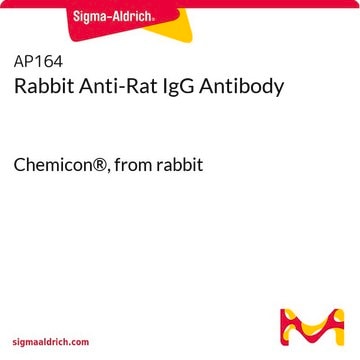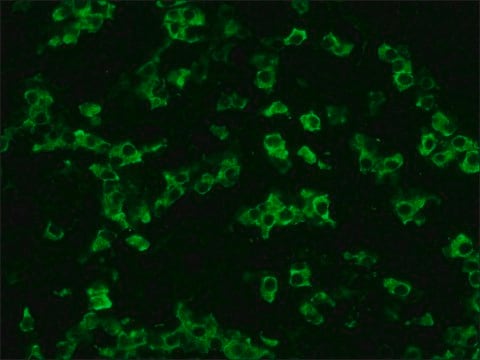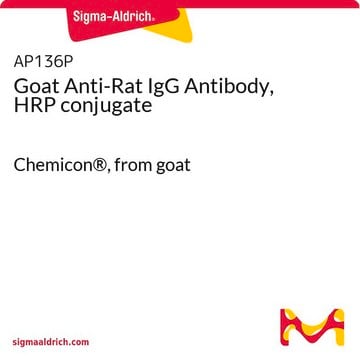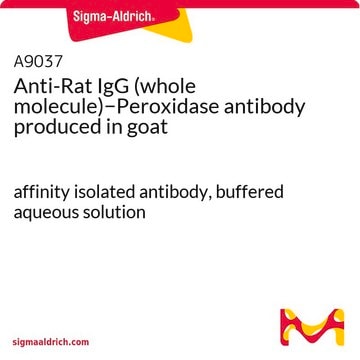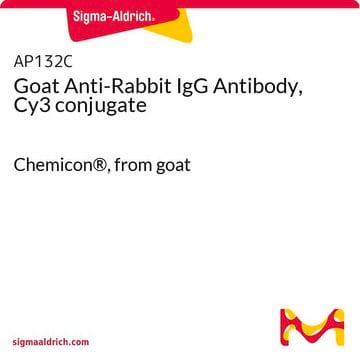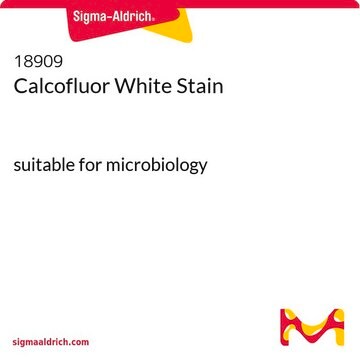F6258
Anti-Rat IgG (whole molecule)–FITC antibody produced in goat
affinity isolated antibody, buffered aqueous solution
Sinónimos:
Goat Anti-Rat IgG (whole molecule)–Fluorescein isothiocyanate
Iniciar sesiónpara Ver la Fijación de precios por contrato y de la organización
About This Item
Productos recomendados
biological source
goat
Quality Level
conjugate
FITC conjugate
antibody form
affinity isolated antibody
antibody product type
secondary antibodies
clone
polyclonal
form
buffered aqueous solution
technique(s)
direct immunofluorescence: 1:32
storage temp.
2-8°C
target post-translational modification
unmodified
General description
An immunoglobulin has two heavy chain and two light chain connected by disulfide bond. It mainly helps in immune defense. It is a glycoprotein. IgG is a major class of immunoglobulin. Immunoglobulin G (IgG) participates in hypersensitivity type II and type III. Rat has five immunoglobulin classes- IgM, IgG, IgA, IgD and IgGE. IgG has four subclasses- IgG1, IgG2a, IgG2b and IgG2c. It helps in opsonization, complement fixation and antibody dependent cell mediated cytotoxicity.
IgG antibody subtype is the most abundant serum immunoglobulins of the immune system. It is secreted by B cells and is found in blood and extracellular fluids and provides protection from infections caused by bacteria, fungi and viruses. Maternal IgG is transferred to fetus through the placenta that is vital for immune defence of the neonate against infections. Anti-Rat IgG (whole molecule)-FITC antibody is specific for all rat IgG subclasses. Goat anti-rat IgG is purified by affinity isolation and then conjugated to FITC.
IgG is the main antibody type found in plasma and extracellular fluid and is expressed on B cell membrane. It regulates several functions such as complement activation and phagocytosis and hence plays a pivotal role in facilitating cytological immune responses. Anti-rat IgG (whole molecule)-FITC antibody can be used as a secondary antibody in indirect immunofluorescence. Goat anti- rat IgG (whole molecule)-FITC antibody reacts specifically with all rat immunoglobulins.
Immunogen
Purified rat IgG
Purified rat IgG.
Application
Anti-Rat IgG (whole molecule)−FITC antibody has been used in immunofluorescence measurement of antibody-treated cells and staining of monolayers.
Anti-Rat IgG (whole molecule)-FITC antibody may be used for immunofluorescent labeling of rat spleen cells. For immunofluorescence of rat cartilage tissue sections, a concentration of 5-10 μg/ml was used. The range of dilutions of anti-rat IgG used for immunofluorescence is between 1:10 and 1:250 in various studies.. The antibody was also used in flow cytometry applications.
Anti-rat IgG (whole molecule)-FITC antibody (diluted 1:20 in PBS) can be used as a secondary antibody in immunolabelling. It can also be used in flow cytometry.
Physical form
Solution in 0.01 M phosphate buffered saline, pH 7.4, containing 1% bovine serum albumin and 15 mM sodium azide
Disclaimer
Unless otherwise stated in our catalog or other company documentation accompanying the product(s), our products are intended for research use only and are not to be used for any other purpose, which includes but is not limited to, unauthorized commercial uses, in vitro diagnostic uses, ex vivo or in vivo therapeutic uses or any type of consumption or application to humans or animals.
¿No encuentra el producto adecuado?
Pruebe nuestro Herramienta de selección de productos.
Storage Class
10 - Combustible liquids
flash_point_f
Not applicable
flash_point_c
Not applicable
Elija entre una de las versiones más recientes:
¿Ya tiene este producto?
Encuentre la documentación para los productos que ha comprado recientemente en la Biblioteca de documentos.
Los clientes también vieron
Paola Cassis et al.
JCI insight, 3(15) (2018-08-10)
Sodium-glucose cotransporter 2 (SGLT2) inhibitors have pleiotropic properties beyond blood glucose-lowering effects and modify important nonglycemic pathways, leading to end-organ protection. SGLT2 inhibitors display renoprotective effects in diabetic kidney disease, which creates a rationale for testing the therapeutic potential of
Sim K Singhrao et al.
Microscopy research and technique, 72(7), 501-506 (2009-03-21)
Immunofluorescence labeling on postembedded tissue in resin is a formidable task. Although resin components and stabilizers are a source of additional strong native fluorescence that overlaps with absorption and emission spectra of commonly used green fluorophores, the unfixed tissue is
Yung-I Lee et al.
American journal of botany, 100(11), 2121-2131 (2013-10-19)
Protocorm-like bodies (PLBs) of orchids are important in orchid micropropagation and outwardly resemble somatic embryos in form and development. To determine whether PLBs are truly embryogenetic, we compared PLBs with somatic embryos and zygotic embryos to determine whether they had
Receptors involved in lymphocyte homing: relationship between a carbohydrate-binding receptor and the MEL-14 antigen.
Yednock T A, et al.
The Journal of cell biology, 104(3), 725-731 (1987)
Aged HCT-8 cell monolayers support Cryptosporidium parvum infection
Sifuentes L Y, et al.
Applied and Environmental Microbiology, 73(23), 7548-7551 (2007)
Nuestro equipo de científicos tiene experiencia en todas las áreas de investigación: Ciencias de la vida, Ciencia de los materiales, Síntesis química, Cromatografía, Analítica y muchas otras.
Póngase en contacto con el Servicio técnico